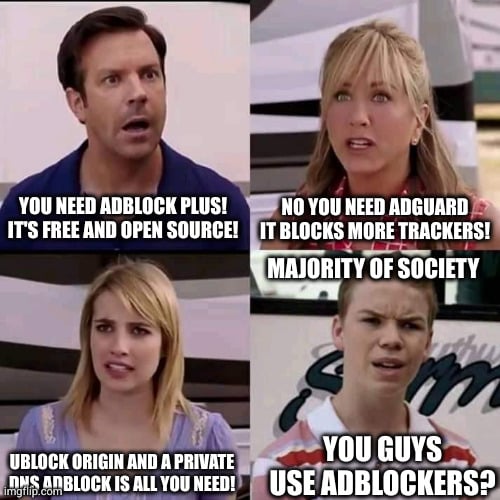this post was submitted on 17 May 2024
915 points (97.2% liked)
memes
17461 readers
3910 users here now
Community rules
1. Be civil
No trolling, bigotry or other insulting / annoying behaviour
2. No politics
This is non-politics community. For political memes please go to !politicalmemes@lemmy.world
3. No recent reposts
Check for reposts when posting a meme, you can only repost after 1 month
4. No bots
No bots without the express approval of the mods or the admins
5. No Spam/Ads/AI Slop
No advertisements or spam. This is an instance rule and the only way to live. We also consider AI slop to be spam in this community and is subject to removal.
A collection of some classic Lemmy memes for your enjoyment
Sister communities
- !tenforward@lemmy.world : Star Trek memes, chat and shitposts
- !lemmyshitpost@lemmy.world : Lemmy Shitposts, anything and everything goes.
- !linuxmemes@lemmy.world : Linux themed memes
- !comicstrips@lemmy.world : for those who love comic stories.
founded 2 years ago
MODERATORS
you are viewing a single comment's thread
view the rest of the comments
view the rest of the comments

Eh, I'm not sure it's much improved. In the ad model, the content creator owned the site and got money from selling ads. The more traffic they got, the more they could charge. In the new model, a corporation owns the site and takes a cut of whatever the creator generates.
Not necessarily. For instance, YouTube uses the old ad model and is of course not creator owned.
Additionally, you can use patreon while also using (and capitalising on) your own content distribution systems.
This is all to say, I do think the ad model may stay somewhat relevant, however, I also think that other income avenues are helpful and enable content creators more flexibility in terms of the manner in which they think they can best reach their audiences while generating income
Worth pointing out that ad blockers don't work for ads that are inserted into a video stream, so there was no need to change that model there. Also, YouTube is an example of a site that's not owned by the content creator. YouTube makes the money from the ads, then gives the significant creators a cut.
I wonder how stable the situation for in-stream ads really is. Paid sponsorships are nothing new, yet with browser extensions like sponsorblock becoming more and more popular I doubt the arms race will stop any time soon.